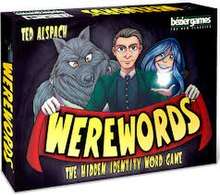Werewords
Werewords is a board game for 4 to 10 players designed by Ted Alspach and published by Bézier Games in 2017.[1][2] players guess a secret word by asking questions. There are different roles randomly assigned at the start of play. Villagers try to find out the magic word before the time is up while the werewolves are trying to mislead them.[3]
 | |
| Designer(s) | Ted Alspach |
|---|---|
| Illustrator(s) | Jason Boles |
| Publisher(s) | Bézier Games (2017) |
| Players | 4-10 |
| Setup time | 2 minutes |
| Playing time | 10 minutes |
| Random chance | Low |
| Skill(s) required | Word games, Party game |
The Deluxe edition was released via Kickstarter, raising almost $100000. Werewords received positive reviews.
The German version of Werewords, "Werewörter" was nominated for the 2019 Spiel des Jahres.
Gameplay
In Werewords, players receive first their secret roles: villagers or werewolves. Then the players ask questions to the mayor in order to guess the secret word before the time is up. The werewolves try to misguide the other players in their quest for the magic word. If the villagers don't guess the word in time, they can still win by identifying the werewolf.[4] To help the villagers out, one player is the Seer, who knows the word but must not to be too obvious when helping them figure it out; if the word is guessed, the werewolf can pull out a win by identifying the Seer.[5]
A free iOS/Android app provides thousands of words in hundreds of categories at various difficulty levels, so everyone can play.[6]
Release and reception
Werewords was initially released in 2017. Then a Deluxe version in 2018 was sold via Kickstarter, with about 2,400 backers contributing almost $100,000 during the campaign.[7]
Werewords was nominee and won the 2017 Golden Geek Best Party Game Nominee.[8] [9]
See Also
- The design and the ambiance of Werewords is taken from the original game Werewolf, edited in an upgraded version by Ted Alspach known as Ultimate Werewolf.
References
- Games, Bezier. "Werewords". Bezier Games.
- "Werewords". BoardGameGeek.
- "WEREWORDS is Back With a New Deluxe Edition - Geek and Sundry". 29 August 2018.
- "Werewords (Game Review by Chris Wray)". 1 May 2017.
- http://islaythedragon.com/featured/review-werewords/
- "Werewords - Apps on Google Play". play.google.com.
- "Werewords Deluxe Edition". Kickstarter.
- "2017 Golden Geek Best Party Game Nominee - Board Game Honor - BoardGameGeek". boardgamegeek.com.
- "2017 Golden Geek Best Party Game Winner - Board Game Honor - BoardGameGeek". boardgamegeek.com.